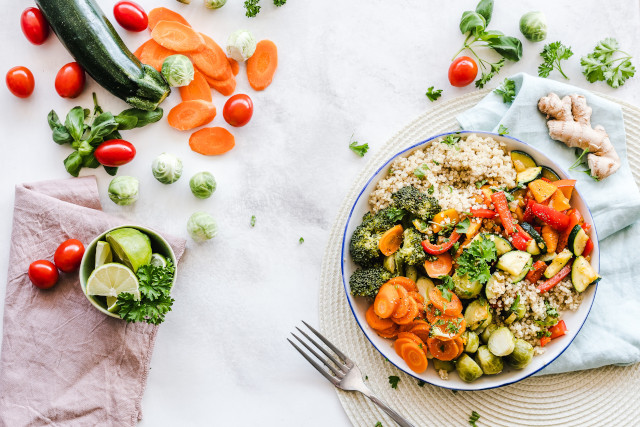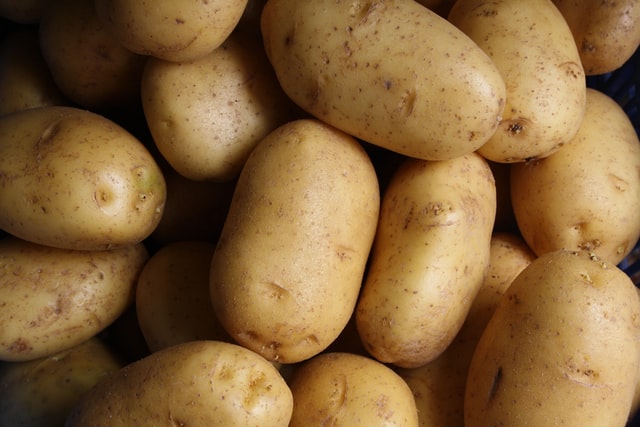
Potatoes are naturally fat-free, cholesterol-free and sodium free. The potato is a root vegetable that is an excellent source of Vitamin C, Vitamin B, high in fiber and also a great source of Potassium. It is a fact that foods that are high in potassium and low in sodium could reduce the risk of high blood pressure and strokes. Scientifically, these are facts, however, there are times when potatoes are not a welcome addition to a diet.
For those that have the chronic condition of Diabetes, potatoes are on the warning list. However, that is changing slowly. It is now recognized that it is not the potato that is dangerous for those with Diabetes, it is moreso the toppings that are used with the potato.
This does not mean that the potato is completely a safe food. The potato has starch, it is actually considered a high starch food. Starchy foods take the body longer to break down since it is considered a complex carbohydrate. It is however, important to understand how the potato will affect those with Diabetes. The potato will have an effect on blood sugar levels, even when watching the portion size closely.
Where the problem lies with most potatoes happens to be the toppings put on the potatoes, the way the potatoes are cooked and the amount eaten. For instance, one medium potato, when baked, is quite healthy. When the sour cream, salt, butter or bacon bits are added, the healthy level drops considerably.
Potatoes and Diabetics
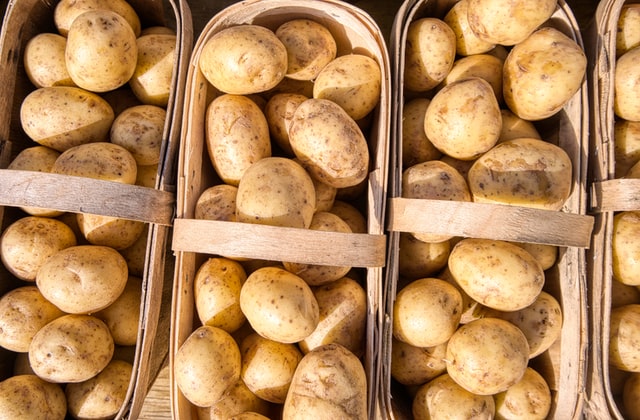
As stated, potatoes are nutritious and are recommended as part of a healthy diet. The misconception comes in because it was once believed that Diabetics should avoid all potatoes. They are to be avoided due to the starch level and the high Glycemic Index level they have.
People with Diabetes should be mindful of the portion sizes they consume and the manner in which the potato is prepared. The portion size and method of preparing is the biggest concern for those with diabetes.
Potatoes should be eaten alongside low GI foods, those that will provide you with healthy fats, lean protein and lean protein. This would even out the nutritional benefits of the entire meal. Eating foods that are high in fiber are great for diabetics, leaving the skins on the potatoes will give the added benefit of more fiber. High fiber foods help maintain blood sugar levels.
Best Choices of Potatoes for Diabetics

Of course, like all foods, there are some that are better than others. This case is no different. When it comes to potatoes, Sweet Potatoes are recommended for diabetics more often.
Sweet Potatoes are one of the best types of potatoes for those with diabetes. The sweet potato is low on the GI and also contains more fiber than the white potatoes. Sweet potatoes are a great source of calcium and Vitamin A.
The way you choose to prepare the sweet potato will have an impact on the GI. Simply put, cooking as a whole potato is lower on the GI that dicing or mashing the potato. When you cook a potato, it makes the starch more easily digestible, and allowing it to cool slightly after cooking will also benefit lowering the GI again.
The obvious healthiest way to prepare a sweet potato is to boil, steam or microwave them. Preparing them in this manner eliminates the added negatives such as salt, fats and sugars. Leaving the skins on the potatoes provides extra fiber. Up to approximately 50% of the phenol compounds are in the skins. These phenolic compounds contain antioxidants that are beneficial to health.
When it comes to potatoes, they are high in carbohydrates that the body can digest quickly. When carbohydrates are digested rapidly, this causes a drastic rise in sugar levels and it will drop just as quickly. This is often known as a sugar rush or sugar high. It is this rise and fall of the blood sugar levels that make people think they are hungry and leads to overeating. In turn this causes obesity which can and often leads to Diabetes.
The method of preparation for a sweet potato is the same suggested for Russets or any other potato. It is best to boil, bake or even grill the potato, leaving the skin on for additional benefits. It is best for everybody, not just diabetics, to avoid heavy fat content toppings such as bacon bits, sour cream and butter. Even cheese can add to the fat amount in the meal. It is best to avoid any additions and enjoy the taste of the natural food, as is.
It is safe to add Sweet Potatoes to your diet if you have Diabetes. However, like many other foods, these should be eaten in moderation. There are many ways that Sweet potatoes can be prepared. There is no reason to not switch out the type of potato that you use in a recipe. For instance, a twice baked potato can be made with a sweet potato just as easily as a Russet or other potato.
Sweet Potatoes wll taste even better on the grill as they have that natural sweetness to them. Just remember that there are some preparation methods that will increase the GI which is what those with diabetes need to avoid. For example, frying or deep frying is definitely going to add to the fat content and reduce the healthy benefits you could obtain by baking the same product.
Carbs
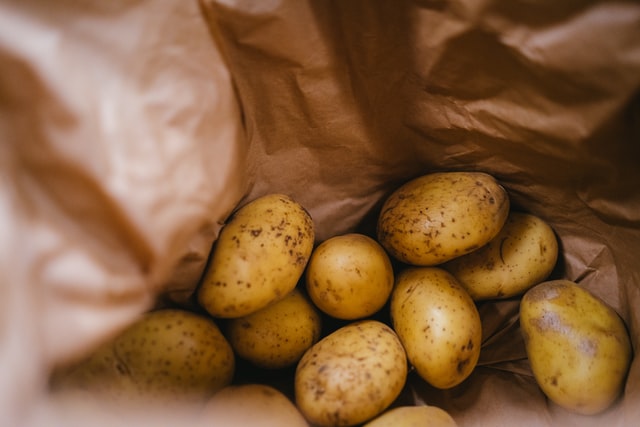
If those with diabetes are concerned, the Diabetic Association has recommendations as far as potatoes and other foods. When following the recommendations, diabetics should be watching the carbohydrates. There are simple carbohydrates, and complex carbohydrates.
The simple carbohydrates should be avoided, if at all possible. These are causing the rapid rise and fall of blood sugar. The complex carbohydrates take longer to be digested, but are turned into the energy your body needs, without the drastic rise and fall in sugar levels.
Again, serving size is the utmost important factor. For instance, one sweet potato is quite large, versus the recommended amount of ⅓ cup for a serving. The ⅓ cup may not seem as though it is enough to fill you up. However, keep in mind that the Sweet potato is loaded with complex carbohydrates.
These are the carbs that help you feel full longer, so you are not grabbing snacks and more food. Overeating leads to weight gain and can turn into obesity, which makes high risk for Type 2 diabetes.
Another way to look at this is to consider it this way. You want to put the best choice of carbohydrates into your body so that your body works the way it is meant to work. You want the food that is going to be loaded with nutrition which will also help to balance out the blood glucose. For this, there is one clear leader. The sweet potato will give the nutrition, the complex carbohydrates to fill you up and help regulate the GI.
Another factor that you need to be mindful of when you have Diabetes, if you are having a sweet potato, eliminate all other forms of carbohydrates from the meal. This means no dinner rolls, bread, or biscuits. The sweet potato is considered the starch for the meal, the remainder of the plate should hold 4 ounces of your choice of protein and the remainder should be fresh or steamed vegetables and fresh fruit.
When you bake or grill a sweet potato, it will caramelize as it is cooking, adding to the flavor. This is natural sugar, not added sugar. You could also marinate the potato in an herb filled marinade or use a dry rub made of herbs to add to the flavor. When you do this type of addition, it is not necessary to add those heavy and fat filled toppings.
Other Benefits
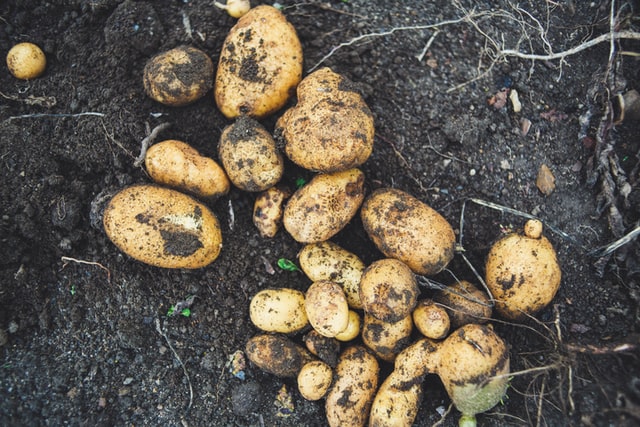
The Sweet potato will also provide other benefits you may not have considered. They prevent Vitamin A deficiency, hep maintain stress levels with the magnesium in the potato, and the vitamins found in sweet potatoes contain anti-inflammatory properties.
Sweet potatoes are thought to help lower the risk of certain cancers, and help guard against ulcers. This potato is believed to help prevent cardiovascular disease, they contain antimicrobial properties which are thought to help prevent pneumonia and typhoid.
Vitamins, such as Vitamin A can help to improve your hair and your skin. The sweet potato will fight skin blemishes and itchy skin. Due to the high fiber content, sweet potatoes are great for digestion. The amount of fiber can help prevent constipation in younger children and adults.
The vitamin A in the sweet potato aids in the fertility of women of childbearing age. Vitamin A helps play a role in reproductive performance. The lack of Vitamin A or deficiency of Vitamin A can and often leads to a secondary infertility. For those couples that are planning a pregnancy, adding sweet potatoes to your meal plans will help improve the chances of becoming parents.


